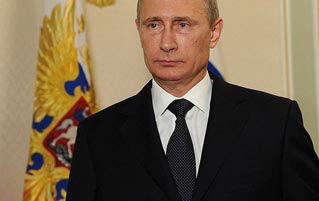Predicting Russia's Next Move With A Super Old Book

Russia has been in the news a lot lately. Secret Russian phone call this, Russian ambassador dead that, and so on. With the specter of Russia looming in American politics, it might be prudent to pause our breathless coverage of Trump giving ambassador Kislyak a reach-around and find out what exactly Russia wants. You know, what their goals are, their aspirations, what they pin on their vision boards. It surely isn't as simple as "Mek those Amyerican kepetalist dogs syuffer." If only we had something that lays out their strategies and objectives, like a handbook of some sort.
Well, it turns out we kinda do. Kinda.
The Foundations Of Geopolitics: The Geopolitical Future Of Russia, written in 1997, is a book by charming debutante Aleksandr Dugin. He's a quirky guy who deserves a bit of background.
Dugin, who effortlessly pulls off the sexy Rasputin look, is a Russian political scientist who has a few slightly fascist viewpoints. Such as his 1997 article "Fascism -- Borderless And Red," in which he uses adorable color metaphors to excitedly predict a fascist Russia that is "... not a faded, brownish-pinkish national capitalism, but the blinding dawn of a new Russian Revolution, fascism -- borderless as our lands, and red as our blood." And in case you think he means some watered-down version of fascism, he clarifies, "genuine, true, radically revolutionary and consistent, fascist fascism." The most fascisty fascism that ever fascisted a fascist.
Dugin's extreme ideas, which sound like something Skeletor would half-ass during a writer's strike, actually have an audience. His views on the "evils of liberalism" are often cited by far-right leaders (including Steve Bannon). His influence even extends to the Kremlin and to the Russian military, having deescalated tensions between Turkey and Russia. Though one would think he'd be the Gandalf to Putin's Bilbo, that relationship is complicated. He's criticized Putin for not being more aggressive in Ukraine, and Putin has kept him at a safe distance so he can harness the crazy without Dugin calling him at 3:00 a.m. to ask, "What'cha thinkin' 'bout?"

Still, it seems that Dugin's book is either an influence on, or at least parallels, the Kremlin's strategies. It's been used as a textbook by Russian military strategists, and some of the similarities between what's laid out in the book and current Russian policy is a little spooky.
The overarching theme of Geopolitics is that the goal of Russia should be the "Finlandization" of Europe. This means giving a large, powerful country -- say, one whose name rhymes with "Shmussia" -- policy control over smaller neighboring countries. Those countries remain "independent," in the same way a ten-year-old declares his independence by wearing their hat backwards. The name is a reference to Russia's control over Finland during the Cold War -- the good old days when the twinkle of nuclear annihilation was in policymakers' eyes.

The book calls for the annexation of Ukraine, which seems a likely goal after the annexation of Crimea and aggressive policy toward the rest of Ukraine. This by itself is not an impressive prediction; Ukraine shares a large border with Russia and is home to a number of Russian separatists. It's an obvious strategic move to try to regain some of that territory, especially after Ukraine has tried to join the EU, a clear threat to Russia's power in the region. But that's not where the parallels end between the 20-year-old book and current events.
Dugin writes that the UK should be separated from the rest of Europe, like some sort of British exit, or "Exbrit," as I like to call it. As it turns out, Kremlin-controlled media pushed for the Brexit. Members of UK's parliament suspect Russian meddling in the Brexit referendum, although no evidence or investigation has yet come about.
While the UK should be shunned, Dugin proposes that Germany and France form a "Franco-German bloc," where "anti-Atlanticist traditions" (that is, against cooperation between Europe, the U.S., and Canada) should be encouraged. Lately, Russia has been trying to inflame far-right, pro-Russia sentiments in Germany and in France. This includes xenophobic fake news stories, meetings with the German far-right, gaining support from presidential hopefuls, and funding right-wing nationalist groups in France and Germany. The far right in Germany and France have, coincidentally, cheered on Brexit and are angling for their own exit votes, Gerexit and Frexit, which unsurprisingly sound like a list of preservatives in Frosted Flakes.

As for America? "he main 'scapegoat' will be precisely the U.S.," writes Dugin. This is about as surprising as a bear pooping in the woods while reading Playbear "for the articles." More intriguing is how the book proposes Russia destabilize the United States. The Rasputin cosplayer writes: "To introduce geopolitical disorder into internal American activity, encouraging all kinds of separatism and ethnic, social and racial conflicts, actively supporting all dissident movements -- extremist, racist, and sectarian groups, thus destabilizing internal political processes in the U.S. It would also make sense simultaneously to support isolationist tendencies in American politics."
This may, among other reasons, explain why Trump is Russia's media darling. His isolationist platform, as well as charming ability to pit Americans against each other along racial and religious lines, make him the perfect orange tornado of destabilization. Of course, now the media honeymoon may be over. It may also explain Russia's love affair with the nationalist far right, the paid Russian internet trolls who frequently post racist memes, the fake news stories about the evils of refugees, and soon some sort of "racism gas" that the Joker will unleash on Gotham New York.

The most oddly specific strategy the book seems to foretell is bribing Japan by offering them the Kuril Islands, which have been contentiously under Russia's jurisdiction. Recently, Prime Minister Shinzo Abe revealed that Trump encouraged him to strengthen ties with Putin to hopefully resolve the conflict over the Islands. Kremlin-controlled news has also pushed this narrative, with articles titled, "Russia, Japan Looking for Common Ground on Kuril Islands," and "USA will seize Kuril Islands immediately if Russia delivers them to Japan."
I think it would be sensationalist to call Foundations Of Geopolitics a blueprint of current Russian strategy. Dugin lays out some obvious and general political philosophies that may simply be popular amongst Russian military strategists. And there are plenty of strategies he writes about that have not been borne out. But it does offer insight into the tools Russia uses to influence the rest of the world: encouraging isolationism, far-right ideologies, xenophobia and racial hatred, and destabilizing rivals to allow Russia a more powerful position. Which is not unlike the strategy of many politicians when jockeying for power -- some right here in the US of A Huge Wall. To combat it requires a public and media willing to be analytical and critical of the more subtle, insidious attempts to manipulate opinion. Unfortunately, this means we should probably focus and stop speculating on whether Trump treated ambassador Kislyak to a nice dinner before some hot, meaty lovemaking.
Seriously, stop imagining it.
To see the two inexplicably polar opposite muses in Trump's life, check out Donald Trump Is The JFK For Millennials (Seriously, Folks) and How Actual Nazis Are Influencing Trump (More Than He Knows).
Subscribe to our YouTube channel to see how this election has forever changed politics in Why This Is The Worst Presidential Election In U.S. History, and watch other videos you won't see on the site!
Also follow us on Facebook. Yuge.
